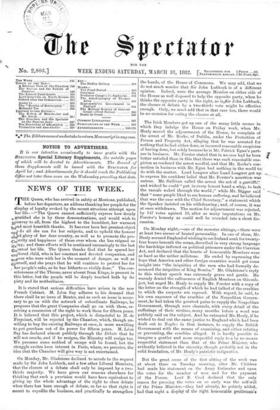On Monday night,—one of the monster sittings,—there were at least
two scenes of heated personality. In one of them, Mr. Healy accused England of wishing to see Ireland sunk for twenty- four hours beneath the ocean, described in very strong language the hardships inflicted on political prisoners under the Coercion Act, and declared that the hearts of honourable Members were as hard as the nether millstone. He ended by expressing the hope that America and other foreign countries would get some insight into "the iniquities of the men who had formally de- nounced the iniquities of King Bomba." Mr. Gladstone's reply to this violent speech was extremely grave and gentle. He warmly denied the callousness of English Members on this sub- ject, but urged Mr. Healy to supply Mr. Forster with a copy of the letter on the strength of which he had talked of the cruelties to which the suspects are exposed. With regard, ho said, to his own exposure of the cruelties of the Neapolitan Govern- ment, he had taken the greatest pains to supply the Neapolitan Government, through sure channels, with every detail of the sufferings of their victims, many months before a word was publicly said on the subject. And he entreated Mr. Healy, if he wished to deal out the same justice to England which had been dealt out to Naples in that instance, to supply the British Government with the means of examining, and either refuting or preventing, the cruelties alleged. It is hardly possible to imagine a gentler and more respectful reply to a by no means respectful statement than that of the Prime Minister, who evidently believed in the sincerity, though probably not in the solid foundation, of Mr. Healy's patriotic indignation.


































